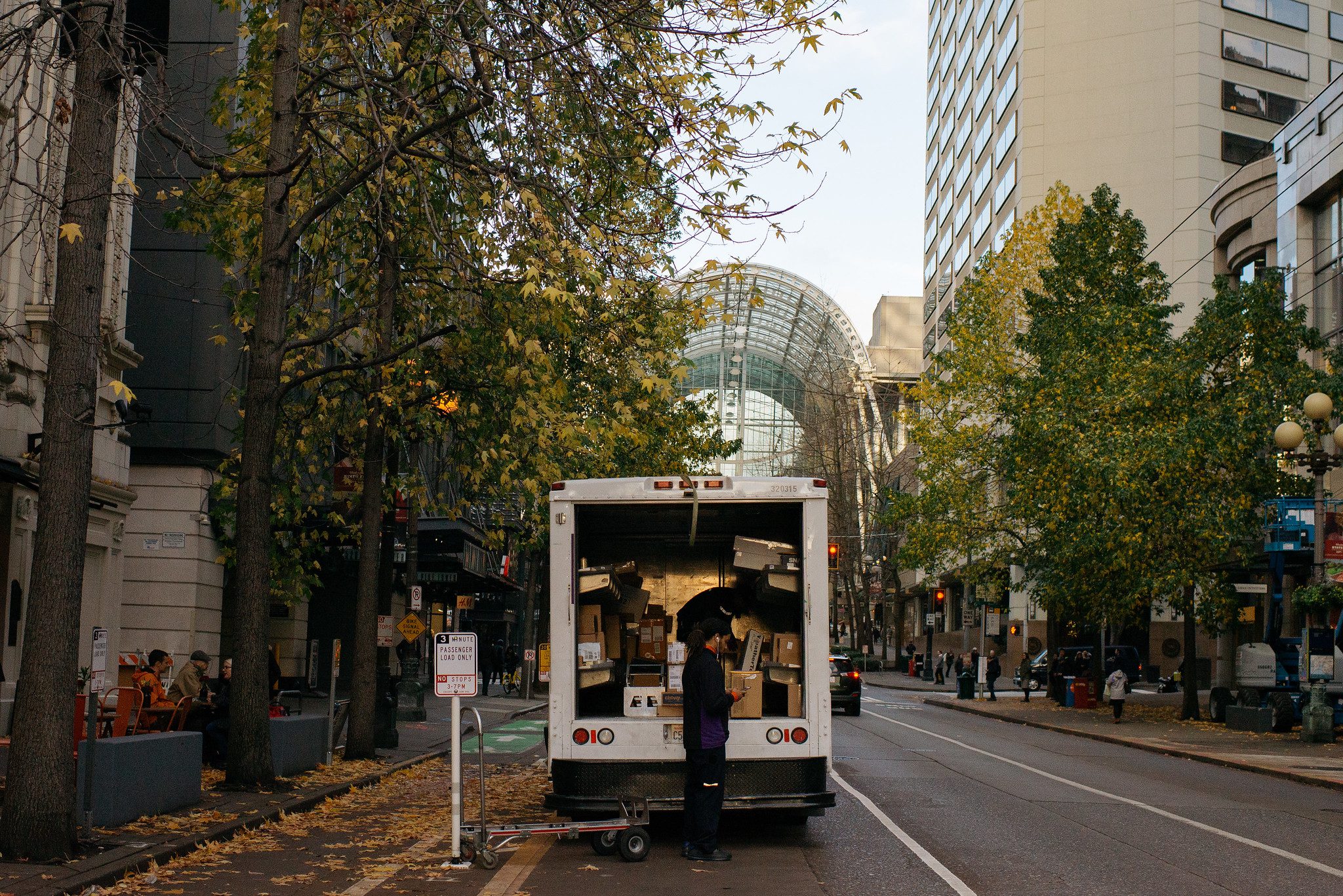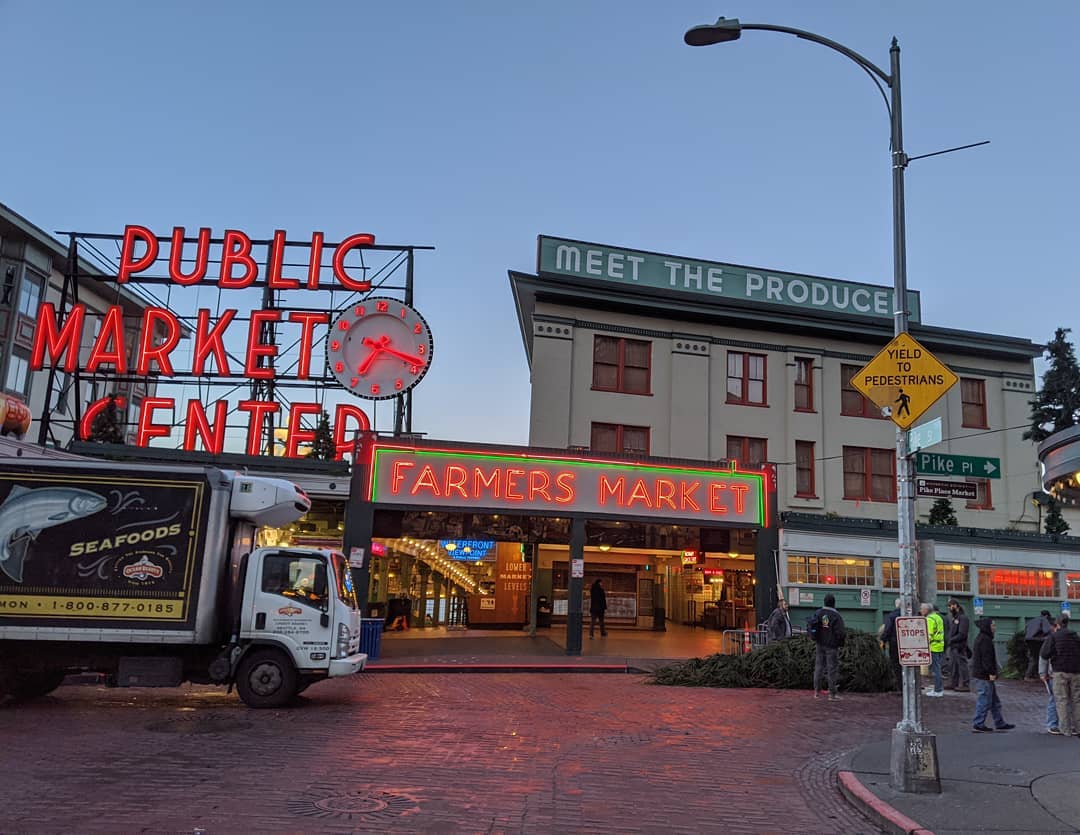 Unloading packages in the street for delivery in Seattle. Photo credit: SDOT.
Unloading packages in the street for delivery in Seattle. Photo credit: SDOT. Summary:
- Since 2010, we’ve been a national leader in managing public curb space and using data to inform on-street parking rates.
- We’ve submitted a new $2 million federal grant application to the U.S. Department of Transportation (USDOT) to build on this success and extend our data-driven approach to commercial vehicle load zones and commercial vehicle permits.
- Our goal is to make the most efficient use of limited curb space in the city, by adopting the latest industry standard, known as the Curb Data Specification (CDS).
- You can read more about what CDS is and its many benefits in our previous blog post.
- We plan to work with stakeholders such as urban freight companies, local businesses, and our project partners, particularly the University of Washington Urban Freight Lab and the Open Mobility Foundation, to advance this effort.
- The proposed pilot project would be located in the Belltown and Denny Triangle neighborhood business districts in north downtown Seattle.
Online shopping and home delivery have transformed our transportation networks, and the effects are felt most intensely in dense, urban areas like Seattle’s neighborhood business districts. E-commerce has more than tripled in the U.S. over the past decade. This, in addition to the effects of the pandemic, has led to fierce competition for very limited space at the curb.
This has numerous consequences: vehicles circling, trucks idling, safety challenges from vehicles unloading in travel lanes, and unsuccessful deliveries for small businesses and residents. Efficient curb space for urban goods delivery is critical to enable Seattle to achieve our climate, safety, and economic development goals.
Seattle has great insights regarding urban freight compared to most cities due to our foundational work with the University of Washington’s Urban Freight Lab. However, when we look to manage urban freight or promote more sustainable modes of delivery, we have not been able to keep pace with the changing dynamics of the industry. We need the ability to measure commercial vehicle activity at the curb to inform how we can best manage this limited space.
To address these challenges, we’ve proposed a federal SMART (Strengthening Mobility and Revolutionizing Transportation) grant project that will use a combination of digital technologies and targeted outreach.
This approach includes three key strategies:
- Engage with local businesses and urban freight companies to understand delivery challenges and build a foundation of trust
- Pilot a prototype digital commercial vehicle permit and use findings to modernize and scale the system
- Collaborate with a national cohort of cities implementing the Curb Data Specification
We expect our project would result in the following benefits:
- Produce a rigorous assessment of the piloted technology system to better understand its scaling potential
- Create a framework for standardizing data collection efforts of commercial curb space
- Create new data-driven commercial vehicle policy and permit recommendations to be enacted during a later phase of work
We expect to hear if we’ve received the grant in early 2023, and work on the project would extend through summer 2024.

“We support this grant because of our interest in last mile delivery policy and operations throughout Seattle… We are supportive of SDOT receiving funds to examine 21st century improvements with potential for new technology. We also endorse SDOT’s focused approach to talk with Seattle businesses and urban freight carriers to hear directly from them about their needs and challenges.”
– Geri Poor, Port of Seattle & Seattle Freight Advisory Board Designee for SMART Grant
“The UW Urban Freight Lab is thrilled to be a partner in this important grant proposal. We look forward to working closely with SDOT, the Open Mobility Foundation, the freight community, and local businesses to help advance real-world research and optimize freight mobility in Seattle.”
– Kelly Rula, Director, Policy and Partnerships, UW Urban Freight Lab
Considering small business effects
- We know that our commercial vehicle permits are primarily used by smaller, local-based businesses with commercial curb needs.
- To begin the project, we, in partnership with the UW’s Urban Freight Lab, would engage in stakeholder outreach to build partnerships and convene local businesses and urban freight companies willing to participate in the prototype and strategic planning efforts.
- The engagement is intended to inform us on typical uses and potential barriers to digitizing the permit, and establish a long-term, trusting relationship with commercial curb users that can advise us in future stages of work.
- The proposed commercial vehicle permit would carefully consider equitable access as well as technical issues like privacy and measure these potential effects through targeted outreach.
- We know many freight carriers can find it challenging to access load zones when making deliveries to local businesses. This project can help us identify areas where existing curb regulations and space allocation should be adjusted to better meet demand and improve access for commercial vehicles.
